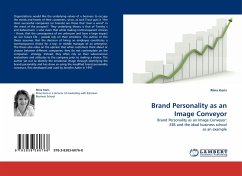Organizations would like the underlying values of a business to occupy the minds and hearts of their customers, since, as Jack Trout puts it the most successful companies (or brands) are those that "own a word in the mind of the prospect". They underlying theory is that of Tversky s and Kahnemann s who claim that while making nontransparent choices those, that the consequence of are unknown and have a large impact on our future life people rely on their emotions. The author of this thesis assumes that the decision of hiring an employee constitutes a nontransparent choice for a top- or middle manager of an enterprise. The thesis also relies on the opinion that when customers think about or choose between different companies, they do not contemplate on the companies strategy. Instead, they often rely on their subconscious evaluations and attitudes to the company prior to making a choice. The author set out to identify the emotional image through identifying the brand personality and has done so using the modified brand personality construct, first developed and used by Jennifer Aaker in 1997.
Bitte wählen Sie Ihr Anliegen aus.
Rechnungen
Retourenschein anfordern
Bestellstatus
Storno








